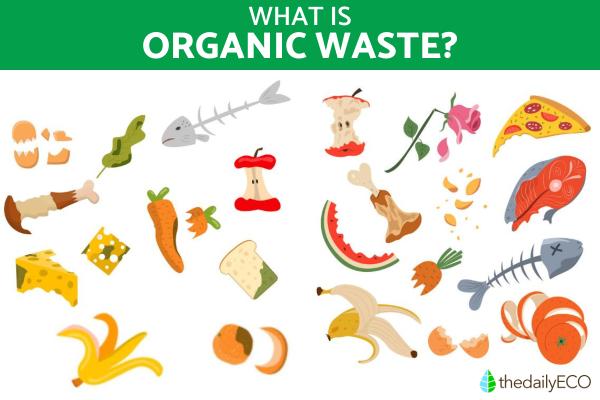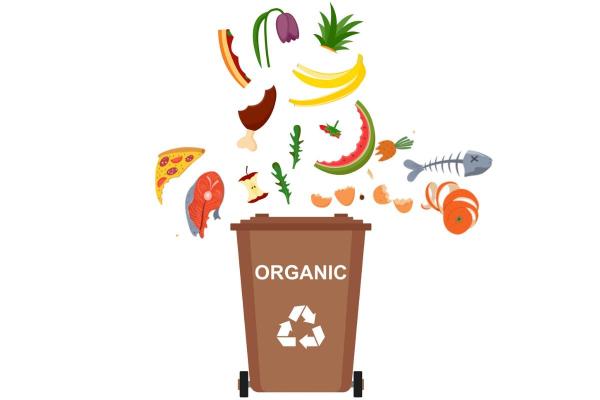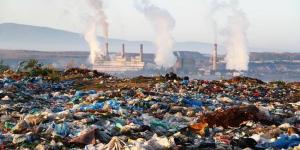What Is Organic Waste?


Recycling organic waste is crucial for environmental sustainability. Organic waste refers to the biodegradable materials that decompose naturally, such as food waste and yard trimmings. When these materials are sent to landfills, they are buried and unable to decompose properly due to poor ventilation, temperature, and humidity conditions.
If you want to learn more about what organic waste is and how it can be recycled, be sure to check out this article from thedailyECO.
What is organic waste?
Waste is a major environmental issue that affects the quality of our surroundings, health, and the natural ecosystems. Waste can be classified into two primary types: organic and inorganic waste.
Organic waste
Organic waste consists of biodegradable materials that were once part of a living organism and undergo rapid decomposition.
Organic waste includes food waste, yard trimmings, and other natural materials that can easily decompose and serve as a nutrient-rich soil amendment. Properly managing organic waste is essential to reduce the amount of greenhouse gases, such as methane, that are produced during its decomposition. Recycling organic waste through composting and anaerobic digestion is an effective way to turn it into useful products and reduce its environmental impact.
Inorganic waste
In contrast, inorganic waste originates from chemical substances and materials that do not come from living beings, such as glass, plastic, and metal. The decomposition of inorganic waste is a slow process that can take thousands of years, making their recycling more complex.
Inorganic waste poses a significant challenge in terms of recycling and disposal. This type of waste includes materials like plastic, metal, and glass, which require specialized facilities and processes to recycle. In addition, inorganic waste takes up a considerable amount of space in landfills, where it can remain for centuries without decomposing.
Sources of organic waste
Organic waste can originate from a multitude of sources, ranging from private households to public institutions. In this article, we will explore the various sources of organic waste in detail:
- Household waste: this includes food scraps, yard waste, and other biodegradable waste generated by households.
- Agricultural waste: this includes crop residues, animal manure, and other waste generated by agricultural practices.
- Food processing waste: this includes waste generated during the processing of food, such as fruit and vegetable peelings, meat trimmings, and other by-products.
- Industrial waste: this includes waste generated by industries such as pulp and paper, textiles, and food processing.
- Municipal waste: this includes waste generated by cities and towns, such as green waste from parks and gardens, and food waste from schools and hospitals.
- Wastewater: this includes organic matter and other pollutants that are removed from wastewater during treatment.
- Animal waste: this includes manure and other waste generated by animals in agricultural and other settings.
- Forestry waste: this includes waste generated during forestry operations, such as branches, leaves, and other by-products.
- Marine waste: this includes waste generated by marine organisms, such as fish and shellfish waste, and other organic matter that is found in the ocean.
You might be interested in this other article, where we explain in more detail what biomedical waste is.
Types of organic waste
When discussing organic waste, it's important to distinguish between the types of waste and the sources from which it comes. While all organic waste shares the common characteristic of being biodegradable, there are significant differences in the specific materials that make up the waste and the ways in which it is generated.
In the previous section, we looked at the main sources of organic waste and in this section, we will explore the different types of organic waste:
- Food waste: this includes leftovers, spoiled or expired food, and food scraps like vegetable peelings, fruit pits, and bones.
- Yard waste: this includes leaves, grass clippings, tree branches, and other plant trimmings.
- Animal waste: this includes animal carcasses, manure, and bedding materials like straw or wood shavings.
- Agricultural waste: this includes crop residues like stalks, husks, and cobs.
- Wood waste: this includes sawdust, wood chips, and wood shavings.
- Biodegradable waste: this includes items like paper products, cotton, and other materials that can break down naturally over time.
- Organic sludge: this includes sewage sludge and other organic waste generated by wastewater treatment plants.
Proper management of organic waste is essential to reduce its environmental impact and promote a circular economy. By understanding the different sources of organic waste and implementing sustainable waste management practices, we can contribute to a more sustainable future.

How to manage organic waste
Managing organic waste involves a range of activities aimed at reducing its negative environmental impact while extracting its potential value. The following are some ways to manage organic waste:
- Composting: composting is a natural process that turns organic waste into nutrient-rich soil. The process involves piling up organic waste and allowing it to decompose under controlled conditions. Composting can be done at home using a compost bin or pile, or it can be done on a larger scale at a composting facility.
- Anaerobic digestion: anaerobic digestion is a process that breaks down organic waste in the absence of oxygen, producing biogas and fertilizer. This process is commonly used to treat sewage sludge, agricultural waste, and food waste.
- Vermicomposting: is a type of composting that uses worms to break down organic waste. The worms consume the organic matter and produce a nutrient-rich fertilizer called vermicompost.
- Bioreactor technology: bioreactor technology involves the use of microorganisms to break down organic waste in a controlled environment. This technology is commonly used to treat industrial and municipal organic waste.
- Land application: organic waste can also be applied to land as a fertilizer. However, it is important to ensure that the organic waste is properly treated to eliminate pathogens and other harmful substances before it is applied to land.
- Recycling: organic waste can be recycled into products such as paper, cardboard, and bioplastics.
- Waste-to-energy: organic waste can also be used to generate energy through processes such as incineration, gasification, and pyrolysis. However, these processes can have negative environmental impacts and should be carefully managed to minimize their impact.
Managing organic waste involves a range of approaches and technologies that aim to extract its potential value while minimizing its environmental impact.
Do not miss this other article where we explain what solid waste is.
Benefits of managing organic waste
Managing organic waste can provide numerous benefits to both the environment and society as a whole. Here are some of the key benefits:
- Reduction in greenhouse gas emissions: when organic waste is not properly managed, it can decompose and release harmful greenhouse gases, such as methane, into the atmosphere. By properly managing organic waste through composting or anaerobic digestion, these emissions can be significantly reduced.
- Soil health: composting organic waste can produce nutrient-rich soil amendments that can be used to improve soil health and fertility. This can lead to healthier plant growth, which in turn can support more diverse and abundant ecosystems.
- Reduction in landfill waste: landfills are a major source of environmental pollution, emitting harmful gases and liquids into the environment. By diverting organic waste from landfills, the amount of waste in landfills can be reduced, reducing the negative impact on the environment.
- Cost savings: properly managing organic waste can also lead to cost savings for municipalities, businesses, and individuals. Composting and anaerobic digestion can reduce the need for landfill space, which can be expensive to maintain. Additionally, compost can be used as a natural fertilizer, reducing the need for costly synthetic fertilizers.
- Job creation: organic waste management can also provide job opportunities in areas such as composting, anaerobic digestion, and waste collection. This can support local economies and provide employment opportunities for individuals.
Properly managing organic waste can have significant benefits for both the environment and society, making it an important area of focus for individuals, businesses, and governments alike.
Be sure to check this other article on how to get rid of bricks and building rubble.
If you want to read similar articles to What Is Organic Waste?, we recommend you visit our Recycling and waste management category.






